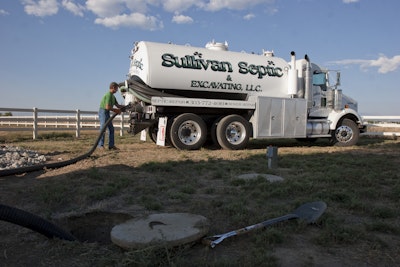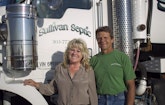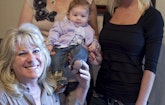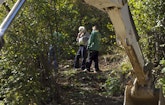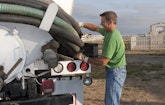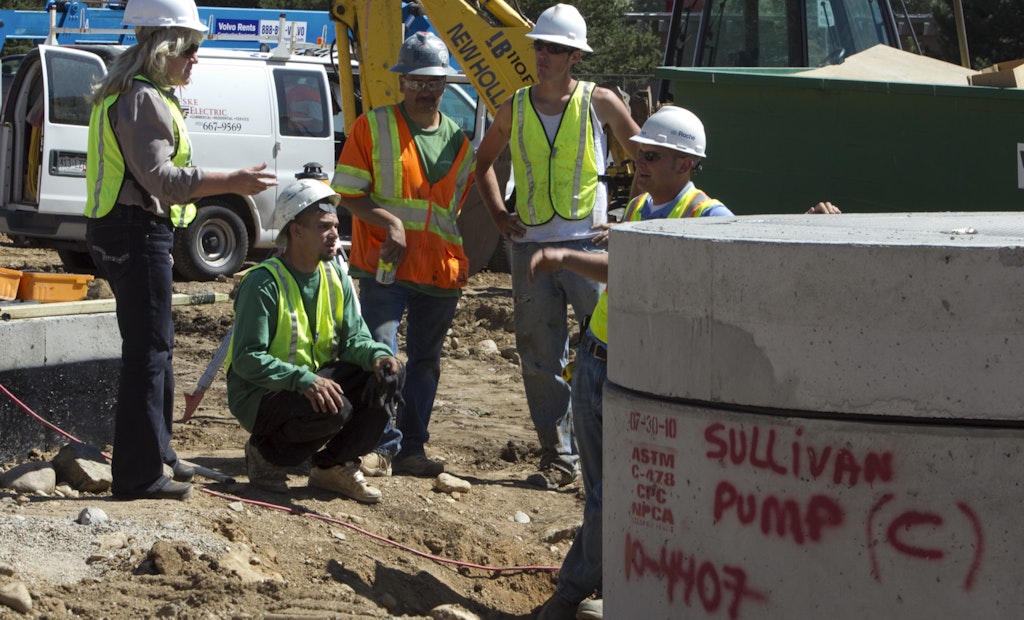
Interested in Plumbing?
Get Plumbing articles, news and videos right in your inbox! Sign up now.
Plumbing + Get AlertsIn January 2010, Cindy Sullivan was diagnosed with cancer — for the third time in her life. By June, she was back in the office full time handling permits, bidding, ordering materials and coordinating with customers and inspectors for Sullivan Septic & Excavation of Longmont, Colo., the 16-year-old business she co-owns with husband, Kevin.
Quitting was never an option. “Kevin and I have worked too hard to get where we are to stop now,” she says. “You just go. You stumble through it.”
Cindy, 54, learned she had thyroid cancer after noticing a persistent lump in her throat. Surgical removal of her thyroid in March was followed by radiation treatments. Cindy had a brief scare when doctors initially thought the cancer had migrated to her liver. Fortunately, the cancer hadn’t spread and doctors regulated her thyroid functions with medications. She was able to return to work part time by May.
“It was a rough six months,” Cindy says. “It’s very hard when you’re a husband-and-wife team and one of you gets sick.”
Adds Kevin: “Mom-and-pop operations have it tough. Customers aren’t going to wait around.”
Keeping the Business Going
For the Sullivans, keeping the business going meant putting in longer hours and working around doctor appointments and recuperation time. Soon after they learned of Cindy’s latest illness, the couple discussed how they would operate the business in her absence.
“The best thing for a husband and wife to do is to talk it through — about how you’ll keep it going,” Kevin says. “You both have to be on board.”
Because Kevin handles septic service work himself (pumping seven to 10 tanks a day), as well as overseeing septic system installation projects, Cindy would be home by herself during much of her recovery.
“She was well aware that she’d be alone. And, there would be some times when I couldn’t work because I needed to be with her,” Kevin says.
During the time Cindy was sidelined, her daughter, Kelly Harris, picked up much of the paperwork duties. Kelly has managed scheduling and billing for the business for seven years. Another daughter, Krystal, started working part time in the office since graduating from Colorado State University.
While having family members available to pick up the workload is important, Cindy says that maintaining a positive attitude is a key in overcoming cancer. She’s had plenty of experience. She survived cervical cancer 10 years ago and successfully went through breast cancer surgery eight years ago.
“I still remember coming back after the breast surgery, sitting on the couch and going through the bills,” Cindy says. “You have to have that drive to keep going.”
A Scrappy Upstart
A drive to succeed was behind the start of Sullivan Septic & Excavating, located about 30 miles north of Denver.
Kevin Sullivan, now 47, moved to Colorado from his native New Jersey in the 1980s after dropping out of college where he studied forestry.
In Colorado, Kevin worked in construction and drove semi trucks. He eventually became an owner-operator and met Cindy, who had run several businesses including a janitorial service and a donut shop.
The couple was familiar with septic service through the experience of Cindy’s farm family, who lived in the area. “We believed the area needed good service and we could provide it,” Kevin says.
In 1994, the Sullivans took out a second mortgage on their home to buy a used vacuum truck. Kevin continued to moonlight as a truck driver the first two years. The couple worked side-by-side to get the business started. “She was right there shoveling rock with me,” he says.
“Pumping was good but it wasn’t full time,” Kevin says. “We found out early on that we had to offer installation and other services.” That included adding inspection cameras, a backhoe and other equipment.
Within two years, the Sullivans hired an employee and Kevin went full time with the business.
Today, Sullivan Septic & Excavation is a full-service contractor with a 50/50 mix of service and installation work within a 50-mile radius of Longmont. Kevin drives the service truck while three other employees handle installations. In addition to handing bids and permits from the office, Cindy is in the field overseeing installation projects with Kevin.
“For the first seven years, we were working seven days a week. Now, we’ve structured things so we take Sundays off,” Kevin says. “Cindy and I do like to work – 12- to 14-hour days are the norm for us.”
The Sullivan installation crew works Monday through Friday. That leaves Saturdays for Kevin to wrap up septic service calls and then sit down with Cindy to plan ahead for the coming week.
For a time, Kevin had a sideline of building service trucks in his own shop using components purchased from various manufacturers. “Interestingly enough, we didn’t sell any for septic use. It was all for the (natural) gas fields,” he says, adding that a regional drilling boom spurred a demand for vacuum trucks to remove water and drilling mud that lubricates the drill bits. Kevin dropped the truck fabrication work as he got busier keeping up with demand for new septic system installations.
Built It Himself
Kevin’s pride and joy is a 2006 Kenworth T-800 service truck that he built out in his shop. The vehicle, which was a Pumper Classy Truck of the Month in 2007, was custom-ordered with a 400-hp Cummins power plant, a 10-speed Eaton Fuller transmission, double frame and drive-axle lockers that keep the truck moving as long as a wheel is on solid ground.
Kevin added a 4,200-gallon steel tank purchased from LMT Inc., a 500-cfm liquid-cooled Wallenstein pump and custom tool boxes on both sides of the truck.
Sullivan’s excavation equipment includes a 2005 Ford 675d loader/backhoe, a 2003 John Deere 410G loader/backhoe, a 2006 Bobcat 430 mini-excavator, a 2008 Yanmar SV100 excavator and a 2001 Vermeer RT70 trencher. The company also uses an M20 jetter from MyTana Mfg. and a J-2512 Typhoon trailer jetter from General Pipe Cleaners.
A Vermeer PB30 pipe-bursting machine is available for sewer system retrofitting projects. The company uses lining systems from PrimeLine Products Inc. The gear is hauled on a 2007 Pace American cargo trailer, a 2010 PJ Trailers tilt trailer and a 2003 Eager Beaver UT2 construction trailer.
Also in the fleet are a 2009 Dodge Ram four-wheel-drive pickup, a 2009 Dodge Ram quad cab four-wheel-drive pickup, a 2004 Ford E350 service van and a 2000 Ford F-150 pickup.
Sullivan Septic has been a long-time user of sewer inspection cameras. Presently, the company has two RIDGID SeeSnake models. Kevin says the cameras are good to have for warranty work. In addition, municipal customers prefer DVD records of sewer lining work.
Expanded Opportunity
Although Sullivan Septic started as a septic service and installation business, Colorado’s strict wastewater discharge guidelines have created a demand for flow meters at commercial customers.
Kevin Sullivan says these installations include resorts and lodges with private septic or lagoon treatment systems as well as industrial customers served by municipal treatment plants.
He generally installs flow meters from Elster Metering.
“If we can help them (customers) prove that their flows are lower than the municipality believes, they’ll save money. Or, we’ll work with them to reduce their flows,” he says.
Local regulations within their service territory also have helped the Sullivans capitalize on their expertise. For example, Boulder County (one of the state’s most-populated counties) requires septic system inspections prior to property transfers. Both Kevin and Cindy are NAWT-certified inspectors.
“We live in a unique area where the environment is taken very seriously,” Kevin says.
Setting Priorities
Reflecting on the past year, Cindy says she’s learned more about herself. In the midst of her recovery, she saw a daughter graduate from college and welcomed the arrival of her second grandchild, Madison Harris.
“Each time you get sick, you try to learn something,” she says. “This time, I really looked hard at striking a balance. I’ve always known that family is super important and that time away from the business is valuable. There is life outside as well.
“And, I recognize how lucky I’ve been.”
